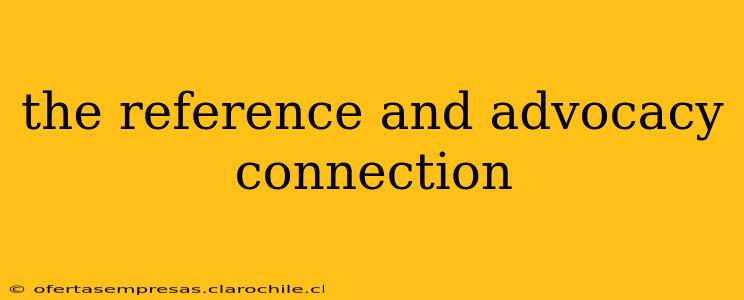In today's competitive job market, having a strong network is crucial. While networking events and online platforms are valuable, the power of personal references and advocates shouldn't be underestimated. The connection between a strong reference and a powerful advocate can significantly boost your career trajectory. This article explores this vital connection, offering insights into leveraging both for maximum impact.
What's the Difference Between a Reference and an Advocate?
While both references and advocates support your career progression, their roles differ subtly yet significantly.
-
Reference: A reference provides verifiable information about your skills, experience, and work ethic. They typically respond to specific questions from potential employers, confirming your capabilities and suitability for a role. Think of them as providing evidence to support your claims.
-
Advocate: An advocate goes beyond simply verifying information. They actively promote your candidacy, highlighting your strengths and championing your potential to decision-makers. They're proactive in your job search, often going the extra mile to secure you an interview or opportunity. They are your champion.
How to Cultivate Strong References
Building a network of strong references requires a proactive and long-term approach.
-
Nurture Professional Relationships: Don't just connect with people; invest in building meaningful relationships with colleagues, supervisors, professors, and mentors. Regular communication, even outside of work contexts, strengthens bonds and fosters trust.
-
Document Your Achievements: Keep a detailed record of your accomplishments, projects, and contributions. This will help you articulate your successes clearly when requesting references and provide your references with specific examples to draw upon.
-
Ask for Permission: Always ask permission before listing someone as a reference. This shows respect and allows them to decline gracefully if they are unable or unwilling to provide a reference at this time. Provide them with your resume and a brief job description to help them prepare.
-
Follow Up and Express Gratitude: After a job application, send a thank-you note to your references, expressing your appreciation for their support. This maintains the relationship and encourages future collaboration.
How to Identify and Develop Powerful Advocates
Identifying and fostering advocates requires building strong, reciprocal relationships based on mutual respect and trust.
-
Seek Mentorship: Find mentors who can guide your career development and provide valuable insights. Mentors often become strong advocates, promoting your growth and potential within their networks.
-
Contribute Value: Offer assistance and support to others in your network. By demonstrating your value, you build reciprocity and strengthen relationships that can lead to advocacy.
-
Network Strategically: Attend industry events and connect with people who share your professional goals. By demonstrating your skills and expertise, you can attract individuals who might become valuable advocates.
-
Maintain Communication: Regularly engage with your advocates, keeping them updated on your progress and seeking their advice. This fosters a strong relationship and demonstrates your appreciation for their support.
What if I Don't Have Strong References or Advocates?
Don't despair! Even if you lack a large network, you can still build one.
-
Volunteer: Volunteering provides opportunities to network and gain experience, building relationships with people who might become valuable references or advocates.
-
Join Professional Organizations: Participating in industry groups allows you to connect with professionals who share your interests.
-
Network Online: Utilize LinkedIn and other online platforms to connect with people in your field.
-
Seek Feedback: Regularly seek feedback from colleagues, supervisors, and mentors to identify areas for improvement and demonstrate your commitment to professional development.
How Can I Leverage References and Advocates Effectively?
- Provide Context: When you provide your references' contact information, give the person you are applying to context on their relationship with you and the kind of insight they can provide.
- Follow Up: After submitting your application, it’s polite and professional to follow up with both your references and your advocates to thank them and keep them informed of the status of your application.
- Strategic Networking: Don’t just seek references and advocates passively; actively build relationships with people who can provide valuable support.
By understanding the difference between a reference and an advocate and actively cultivating these relationships, you can significantly increase your chances of career success. Remember, strong references and advocates are not just about securing a job; they are about building a supportive network that can propel your career forward for years to come.
